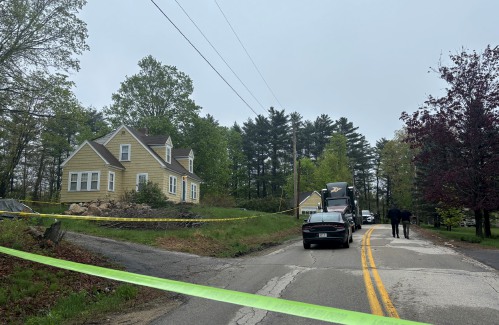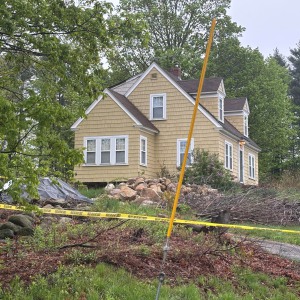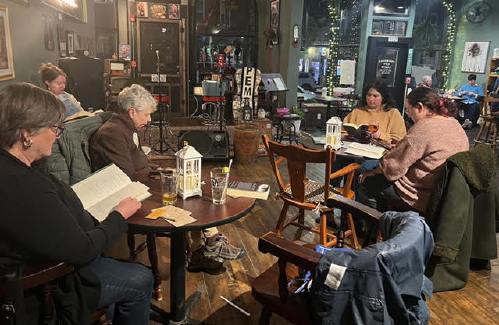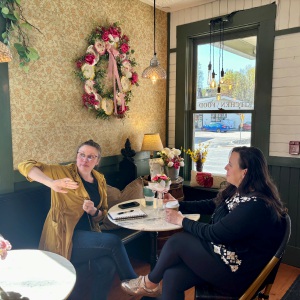
Authorities believe mother shot three year-year-old son in Pembroke murder-suicide
Officials believe a Pembroke mother killed her three-year-old son and then herself early Friday morning.

‘It was all about people’: New Hampshire remembers down-to-earth ‘humanity’ of David Souter, retired U.S. Supreme Court Justice
Bill Dunlap remembers meeting David Souter as a child, shaking his hand.
Most Read
 Authorities believe mother shot three year-year-old son in Pembroke murder-suicide
Authorities believe mother shot three year-year-old son in Pembroke murder-suicide
 Concord Police investigating vehicle versus pedestrian accident in downtown
Concord Police investigating vehicle versus pedestrian accident in downtown
 Twelve acres near Concord Walmart cleared for future retail development
Twelve acres near Concord Walmart cleared for future retail development
 ‘It was all about people’: New Hampshire remembers down-to-earth ‘humanity’ of David Souter, retired U.S. Supreme Court Justice
‘It was all about people’: New Hampshire remembers down-to-earth ‘humanity’ of David Souter, retired U.S. Supreme Court Justice
 Concord Police arrest Franklin man following Facebook Marketplace armed robbery
Concord Police arrest Franklin man following Facebook Marketplace armed robbery
 New Hampshire lawmakers weigh equity and impact of expanding casino industry
New Hampshire lawmakers weigh equity and impact of expanding casino industry
Editors Picks
 The Monitor’s guide to the New Hampshire legislature
The Monitor’s guide to the New Hampshire legislature
 One year after UNH protest, new police body camera footage casts doubt on assault charges against students
One year after UNH protest, new police body camera footage casts doubt on assault charges against students
 ‘It’s always there’: 50 years after Vietnam War’s end, a Concord veteran recalls his work to honor those who fought
‘It’s always there’: 50 years after Vietnam War’s end, a Concord veteran recalls his work to honor those who fought
 ‘We honor your death’ – Arranging services for those who die while homeless in Concord
‘We honor your death’ – Arranging services for those who die while homeless in Concord
Sports

Program offers discounted golf rounds for young players at Concord’s Beaver Meadow
Young golfers will soon have access to deeply discounted rounds of golf in Concord through a partnership between Bank of America and Beaver Meadow Golf Course.
 High schools: Thursday’s area baseball, lacrosse, tennis and track results
High schools: Thursday’s area baseball, lacrosse, tennis and track results
 High schools: Kearsarge, Bow boys’ lax win; more Monday results
High schools: Kearsarge, Bow boys’ lax win; more Monday results
 High schools: Weekend track and lacrosse results
High schools: Weekend track and lacrosse results
 Softball: Taylor sisters lead Concord to walk-off victory in extra innings
Softball: Taylor sisters lead Concord to walk-off victory in extra innings
Opinion

Opinion: My memories of Vietnam 50 years later
Jean Stimmell, retired stone mason and psychotherapist, lives in Northwood and blogs at jeanstimmell.blogspot.com.
 Opinion: Concord officials: Can we sit and talk?
Opinion: Concord officials: Can we sit and talk?
 Opinion: Trump versus the U.S. Constitution
Opinion: Trump versus the U.S. Constitution
 Opinion: Protect our winters!
Opinion: Protect our winters!
 Opinion: That was then. This is now.
Opinion: That was then. This is now.

Your Daily Puzzles

An approachable redesign to a classic. Explore our "hints."

A quick daily flip. Finally, someone cracked the code on digital jigsaw puzzles.

Chess but with chaos: Every day is a unique, wacky board.

Word search but as a strategy game. Clearing the board feels really good.

Align the letters in just the right way to spell a word. And then more words.
Politics

‘A wild accusation’: House votes to nix Child Advocate after Rep. suggests legislative interference
Rosemarie Rung thinks of Elijah Lewis often.
 Sununu decides he won’t run for Senate despite praise from Trump
Sununu decides he won’t run for Senate despite praise from Trump
Arts & Life

Brookford Farm’s annual heifer parade celebrates family, sustainability, organic farming
Join Brookford Farm for a fun-filled day with a farm-fresh lunch, music and dancing on Saturday, May 10 from 10 a.m. to 3 p.m. Get ready to explore the farm, meet the friendly cows, and learn all about sustainable farming practices.
 Pembroke City Limits brings yoga, book club, line dancing, and more to Suncook Village
Pembroke City Limits brings yoga, book club, line dancing, and more to Suncook Village
 The Last Stand Country Band performing in Allenstown
The Last Stand Country Band performing in Allenstown
 Garden Club blossoms in Chichester
Garden Club blossoms in Chichester
Obituaries
 Donald W. Levesque
Donald W. Levesque
Donald W Levesque Webster, NH - Donald W. Levesque, 85, passed away on January 29, 2025 in Naples, FL. He was born on May 20, 1939 in Webstbrook, Maine. Don was the son of Wilfred and Edesse Levesque. He was a devoted husband, father, gr... remainder of obit for Donald W. Levesque
 Herbert Benoit
Herbert Benoit
Bow, NH - Herbert Ray Benoit, 88, passed away on January 23, 2025, in Merrimack, NH. Born on December 17, 1936, in St. Johnsbury, VT, Herb graduated from St. Johnsbury Academy in 1955 and served in the Air National Guard. After his fath... remainder of obit for Herbert Benoit
 Rev. Dr. Louis George
Rev. Dr. Louis George
Hillsborough, NH - Rev. Dr. Louis A George, (89) passed away peacefully on April 30th 2025, at Concord Hospital in New Hampshire. Louis (Lou) was born on July 27th, 1935 the son of Roy and Georgia (Martin) George in Sabinsville, Pennsyl... remainder of obit for Rev. Dr. Louis George
 Linda Rose Westgate
Linda Rose Westgate
Boscawen, NH - Linda Rose Westgate (née Palmer), 71, passed away suddenly on April 23, 2025, in Concord, New Hampshire. Born on September 5, 1953, in Marlborough, Massachusetts, Linda was the beloved daughter of Harold and Pauline Palm... remainder of obit for Linda Rose Westgate


 High schools: Thursday’s softball, baseball, lax and track results
High schools: Thursday’s softball, baseball, lax and track results
 Coffee, community and sustainability coming to Hopkinton store under new ownership
Coffee, community and sustainability coming to Hopkinton store under new ownership
 Keach Park lights up for debate, not public comment, at Council meeting
Keach Park lights up for debate, not public comment, at Council meeting
 Mother’s Day Data: New Hampshire’s declining birth rates impact the workforce and economy
Mother’s Day Data: New Hampshire’s declining birth rates impact the workforce and economy
 New Hampshire Attorney General seeks leads in Mother’s Day murder from 16 years ago
New Hampshire Attorney General seeks leads in Mother’s Day murder from 16 years ago
 Shannon Sciria named new Colby-Sawyer Men’s Basketball head coach
Shannon Sciria named new Colby-Sawyer Men’s Basketball head coach
 Effort to enable town budget caps passes N.H. Legislature
Effort to enable town budget caps passes N.H. Legislature

 Town elections offer preview of citizenship voting rules being considered nationwide
Town elections offer preview of citizenship voting rules being considered nationwide Medical aid in dying, education funding, transgender issues: What to look for in the State House this week
Medical aid in dying, education funding, transgender issues: What to look for in the State House this week On the Trail: Shaheen’s retirement sparks a competitive NH Senate race
On the Trail: Shaheen’s retirement sparks a competitive NH Senate race A city for coffee lovers: Northeast Coffee Festival returning to Concord this weekend
A city for coffee lovers: Northeast Coffee Festival returning to Concord this weekend
